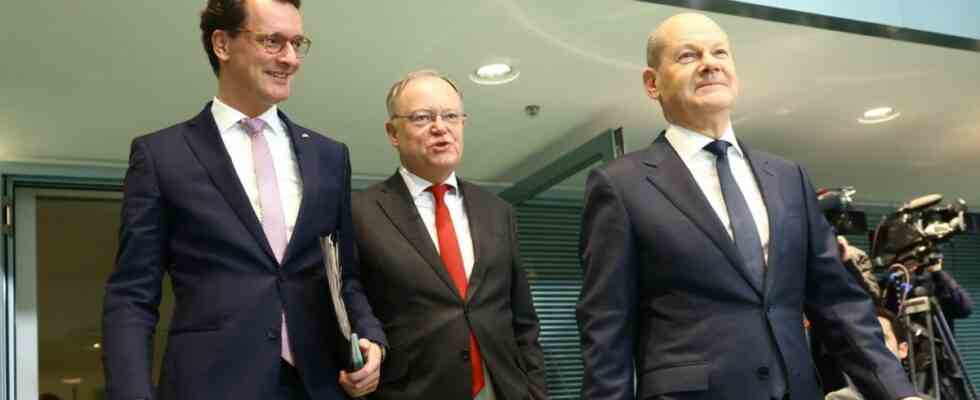The federal and state governments want to introduce the so-called Deutschlandticket in local transport next year and have confirmed that they want to share the costs. This is intended to tie in with the nine-euro ticket that was very successful last summer. “The Germany ticket will come now, also very quickly,” said Federal Chancellor Olaf Scholz after a meeting with the Prime Ministers’ Conference on Thursday evening in Berlin. “We have now removed all the hurdles so that those responsible in the federal states and the transport companies can now do everything to ensure that this progresses quickly and efficiently.”
However, details remained unclear, including the start date. The aim is to start around the end of the first quarter, said Lower Saxony’s Prime Minister Stephan Weil (SPD), but hinted that the start could also be delayed. The introductory price was recently 49 euros, although the ticket is expected to become more expensive later. Exact amounts were not specifically mentioned at Thursday’s press conference.
At the conference between the federal and state governments at the beginning of November, both sides had initially agreed on a successor solution for the popular nationwide nine-euro ticket, it should come at a price of 49 euros. The ticket should therefore already start in January. But then the project continued to be delayed, most recently there was talk of spring.
Irritations between federal and state governments
At a conference of the federal and state transport ministers, it turned out that the costs would probably be higher than the three billion euros that the federal and state governments had initially assumed and which they wanted to share equally. The federal states then declared that they would also bear half of the higher costs, but that the federal government would have to assume the other half. However, Federal Transport Minister Volker Wissing (FDP) did not agree to this. He pointed out that the federal government had already committed 1.5 billion euros for the 49-euro ticket and an additional one billion euros a year for local public transport. The countries were then angry.
The North Rhine-Westphalian Prime Minister Hendrik Wüst (CDU) hinted that the agreement with the federal government in November may have been based on incorrect figures. At that time, the total costs for the federal and state governments were estimated at three billion euros per year. Apparently, however, this was based on calculations by the transport company, in which the ticket price had been set at 69 euros. If you want a 49-euro ticket, “then you won’t find a solution with the calculation basis of a 69-euro ticket,” said Wüst on Thursday. “In the end, it must not go so far that the 49-euro ticket comes, but we cancel services, trains and buses.” Later, at the press conference with Scholz, Wüst said that the Germany ticket was now “on solid ground”.
Protection against high energy prices
The users of oil and pellet heating systems should also be protected from high energy prices. The previously planned gas and electricity price cap does not take these energy sources into account, and the federal states then asked for help for consumers of oil and pellets. After the meeting with the federal states, Scholz said that “a hardship regulation was provided, which is aimed at those who have to cope with price increases that they cannot bear with regard to pellet and oil heating systems”. The federal and state governments also agreed on the details of a hardship fund for companies in the energy crisis.
However, the dispute between the federal and state governments about compulsory insurance against natural hazards was not resolved. The countries had demanded such compulsory insurance to cover damage such as that after the flood of the century in 2021. A corresponding law would have to come from the federal government. Justice Minister Marco Buschmann (FDP) rejected this in the federal-state meeting, said North Rhine-Westphalia’s Prime Minister Wüst, which caused “astonishment”. The issue was then postponed to next year.
The countries should get help with the accommodation of refugees. The federal states had asked the federal government “to make sure that the Federal Agency for Real Estate Tasks (BImA) also made space available wherever possible,” said Wüst. That was also promised. Unusually, the number of refugees remained high this winter, “because the Russian war effort is aimed precisely at expelling people from Ukraine,” said Wüst. The task now is to do justice to people across all levels of government.
Dealing with the Corona rules, which was still the dominant topic last fall, hardly played a role at the meeting of the federal and state governments. Neither Weil nor Wüst saw a problem in the fact that different rules apply in the countries, including the wearing of protective masks.

